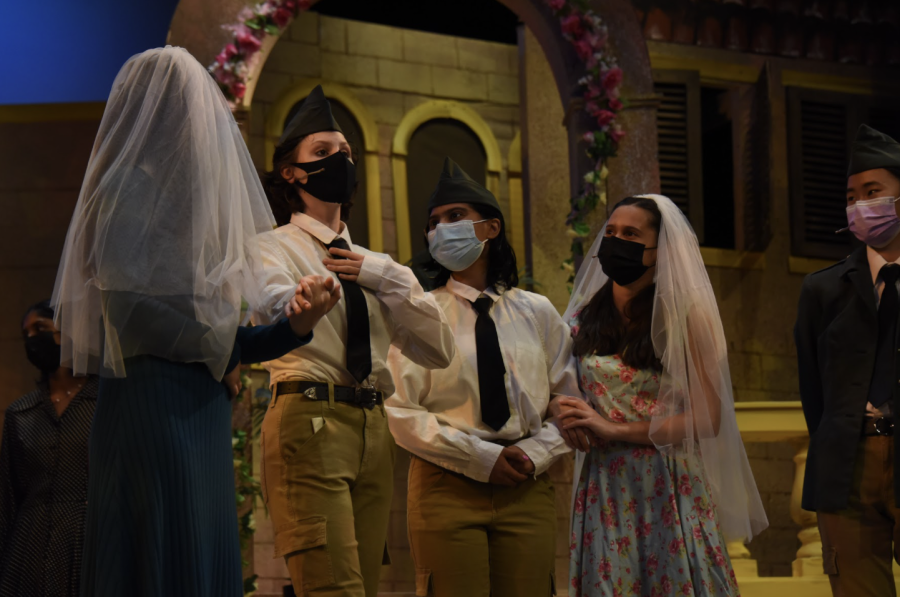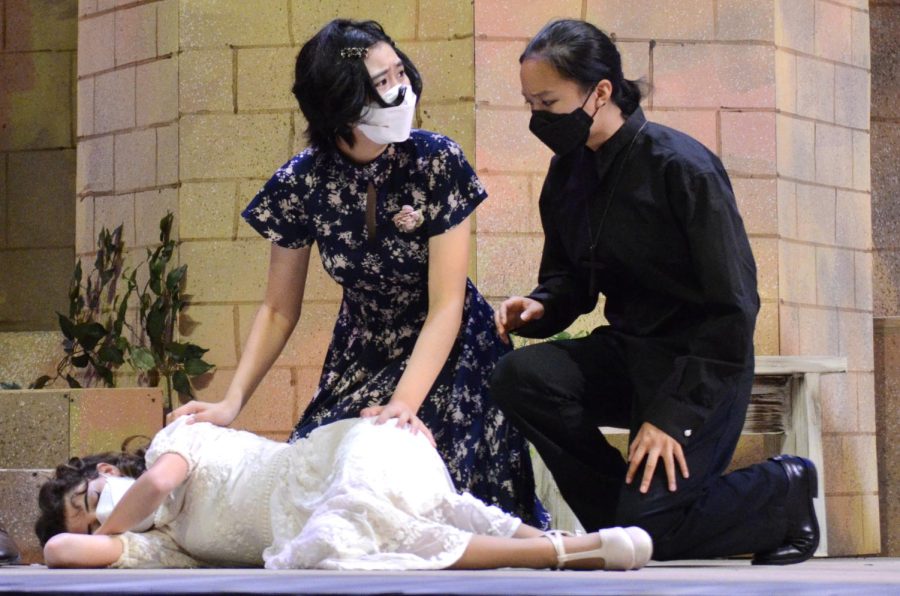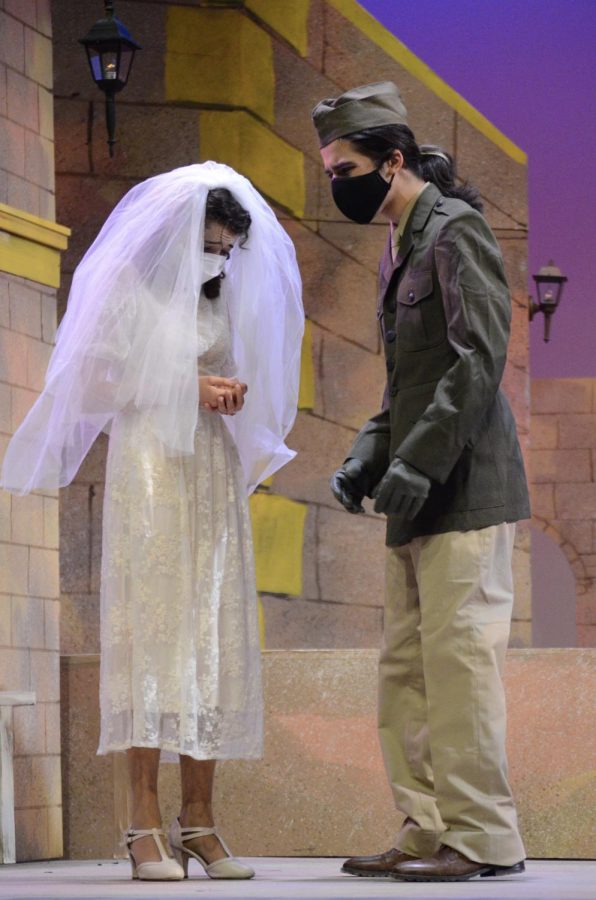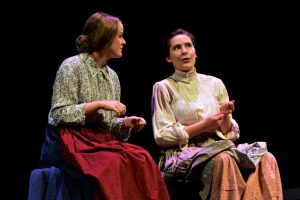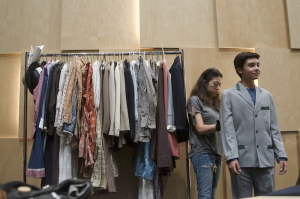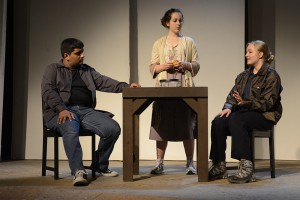Students perform Fall Play ‘Much Ado About Nothing’ as first in-person performance in over a year
Benedick speaks about their marriage and love for Beatrice. In the swing cast, Benedick and Beatrice are played by Avayna Glass (9) and Sonya Apsey (10), respectively.
November 3, 2021
Multicolored lights spin as hues of pink and purple dance across the stage in harmony to the soft instrumental music flowing from the speakers. Soldiers and women don elaborate masks with shimmering silver glitter and golden swirls swooping around the rim as they twirl about the room with their partners. As the end of the song approaches and the ball concludes, the characters exit the stage in a line, their hands latched onto the shoulders of the individual in front of them.
Two casts performed Shakespeare’s romantic comedy “Much Ado About Nothing” for the annual Fall Play in the Patil Theater. The upperclassman evening cast performed at 7 p.m. from Thursday to Saturday, and the underclassman swing cast performed at 2 p.m. on Saturday. Upper school theater teacher Jeffrey Draper and duo Tony and Tanna Kienitz directed the evening and swing casts, respectively.
All 39 students who returned for callbacks received roles after the auditions on Aug. 31 and Sept. 1. Swing cast tickets were free, and evening cast tickets were $15 for adults and $8 for students. Attendees could purchase tickets online or outside Manzanita starting last Wednesday, Oct.27.
“Just being in the presence of other people in the cast is a treasure that I’ve missed so much,” said Allen Boyce (12), who plays a protagonist, Claudio. “There’s a huge amount of bonding that goes on between people who are being vulnerable with each other and exploring different things to do on stage with their characters. Being in that general presence of acceptance and encouragement is the most amazing thing.”
Safety requirements and COVID-19 guidelines required the cast to wear masks on stage, challenging the performers to fully express their characters by utilizing body movements to convey emotion. Unlike previous plays, the cast members each wore a microphone pack to assist with projection and limit the muffled voices caused by masks.
Behind the scenes, the nine-person student technical theater crew worked meticulously to ensure a smooth production. The crew prepared the set, moved props around during performances and fixed technical issues.
“Preparing for the show has a certain feel to it,” said assistant stage manager Sam Parapudi (9), who led the tech crew. “It’s so multifaceted, but everything has to come together to be one cohesive thing and also we [have] to simultaneously not be seen. I just think the art of that is very compelling.”
The play features the journey to love between two couples: the gentle, amiable couple Hero and Count Claudio and the witty, satirical duo Beatrice and Benedick. The four characters are played by evening cast members Paulina Gicqueau (11), Allen, Lucy Feng (11) and Harper Brada (11) and swing cast members Isabella Ribeiro (10), Sasha Masson (10), Sonya Apsey (10) and Avayna Glass (9), respectively.
The play kicks off with soldiers returning to Messina, Italy from World War II. A soldier, Claudio, and Leonata’s daughter, Hero, fall in love and decide to marry. Conversely, Beatrice and another soldier Benedick bicker with each other, but later profess their love to one another due to a plan devised by their friends.
Claudio and Hero’s devotion is challenged by a sinister soldier, Don John, who fabricates a successful scheme to break them apart. However, they soon reconcile, and the couple as well as Benedick and Beatrice marry.
Throughout the production, the characters fret over the chaos and rumors, failing to realize that all the drama boils down to nothing, alluding towards the production’s title.
Lucy believes that the play is notable for multiple reasons, one being that it deviates from the Shakespearean woman stereotype.
“[Beatrice] is one of the more well-written characters,” Lucy said. “There aren’t that many good female characters in old works, but Beatrice has more feminist qualities as she likes to stand up for herself and does not want to fall in love, unlike a lot of more traditional old timey female protagonists. ”
Challenges such as line memorization arose, but in difficult moments, the directors shared their acting experiences and lifted the cast’s spirits through humor.
“Our directors Tony and Tanna are super funny,” Isabella said. “Tony likes to crack jokes, and both of them make rehearsal super fun. They’re always telling stories of their past performances, so it’s really fun hearing all their little anecdotes.”
Shakespearean dialect also posed a challenge, so the cast analyzed the text and adjusted their voice inflections accordingly to produce more natural acting.
“Even though it was in Shakespearean English, it was still easy to understand from the tone of voice and the acting even with the masks,” said Meishin Yen (10), who watched the swing cast’s performance.
As the scriptwriter for both casts, Draper took creative liberty and altered the genders of some of the characters from Shakespeare’s original script. For instance, Shakespeare’s version includes the male character Leonato, but Draper rewrote him as a female under the name Leonata to allow students to explore gender roles.
“When the boys went off to war, the women had this sort of idyllic home, and when the boys came back, they messed everything up,” Draper said. “I changed the genders of some of the people in the play, so that it’s mostly a female home, because exploring what gender can do from Shakespeare and also commenting on gender today is interesting.”
A primary reason Draper selected the play is due to the relevance to current events: people are returning to their normal lives after a devastating pandemic, and the play’s prelude includes soldiers arriving home after a traumatic war.
“There are definitely a few scenes that reach into human emotion and the connectedness of people as they fall in love,” Lucy said. “It’s a good mix of being able to make the audience laugh, but also reminding them that theater is about a connected community.”


















![“[Building nerf blasters] became this outlet of creativity for me that hasn't been matched by anything else. The process [of] making a build complete to your desire is such a painstakingly difficult process, but I've had to learn from [the skills needed from] soldering to proper painting. There's so many different options for everything, if you think about it, it exists. The best part is [that] if it doesn't exist, you can build it yourself," Ishaan Parate said.](https://harkeraquila.com/wp-content/uploads/2022/08/DSC_8149-900x604.jpg)




![“When I came into high school, I was ready to be a follower. But DECA was a game changer for me. It helped me overcome my fear of public speaking, and it's played such a major role in who I've become today. To be able to successfully lead a chapter of 150 students, an officer team and be one of the upperclassmen I once really admired is something I'm [really] proud of,” Anvitha Tummala ('21) said.](https://harkeraquila.com/wp-content/uploads/2021/07/Screen-Shot-2021-07-25-at-9.50.05-AM-900x594.png)







![“I think getting up in the morning and having a sense of purpose [is exciting]. I think without a certain amount of drive, life is kind of obsolete and mundane, and I think having that every single day is what makes each day unique and kind of makes life exciting,” Neymika Jain (12) said.](https://harkeraquila.com/wp-content/uploads/2017/06/Screen-Shot-2017-06-03-at-4.54.16-PM.png)








![“My slogan is ‘slow feet, don’t eat, and I’m hungry.’ You need to run fast to get where you are–you aren't going to get those championships if you aren't fast,” Angel Cervantes (12) said. “I want to do well in school on my tests and in track and win championships for my team. I live by that, [and] I can do that anywhere: in the classroom or on the field.”](https://harkeraquila.com/wp-content/uploads/2018/06/DSC5146-900x601.jpg)
![“[Volleyball has] taught me how to fall correctly, and another thing it taught is that you don’t have to be the best at something to be good at it. If you just hit the ball in a smart way, then it still scores points and you’re good at it. You could be a background player and still make a much bigger impact on the team than you would think,” Anya Gert (’20) said.](https://harkeraquila.com/wp-content/uploads/2020/06/AnnaGert_JinTuan_HoHPhotoEdited-600x900.jpeg)

![“I'm not nearly there yet, but [my confidence has] definitely been getting better since I was pretty shy and timid coming into Harker my freshman year. I know that there's a lot of people that are really confident in what they do, and I really admire them. Everyone's so driven and that has really pushed me to kind of try to find my own place in high school and be more confident,” Alyssa Huang (’20) said.](https://harkeraquila.com/wp-content/uploads/2020/06/AlyssaHuang_EmilyChen_HoHPhoto-900x749.jpeg)



